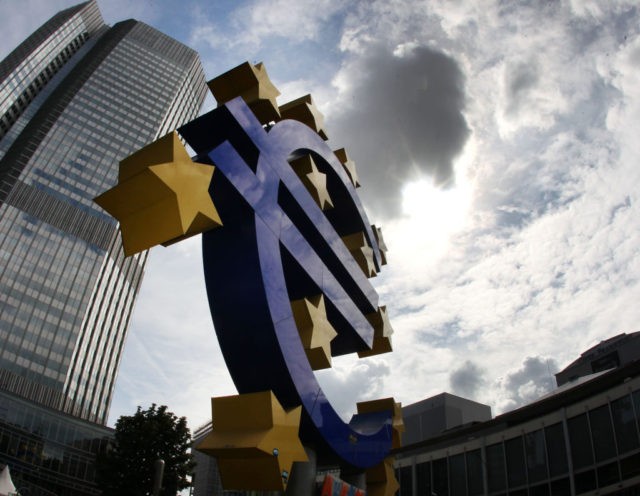This morning’s key headlines from GenerationalDynamics.com
- German 10 year bund yield goes negative, as deflationary spiral continues
- Brexit: The polls versus the bookies
German 10 year bund yield goes negative, as deflationary spiral continues

The Sun (London) endorsed Brexit option to ‘leave the EU’, as stocks sold off and German bond yields went negative (ZeroHedge)
The interest rate paid by Germany’s Bundesbank (central bank) if you deposit money with them for ten years has gone negative. That means that if you deposit money with them, then you will get less money back, instead of more money, as would happen in “normal” times.
That is the meaning of the announcement that the yield (interest rate) on Germany’s 10-year bund (bond) fell briefly on Tuesday to -0.033%, before closing at the end of the day at -0.028%. It also means that if the Bundesbank lends money to someone, then they’ will pay you to take their money, rather than charge you.
Of course, ordinary citizens cannot borrow money from the central bank, but regional banks can. The Bundesbank wants to encourage regional banks to borrow money, and then lend that money out to businesses to stimulate the economy. That is the reasoning behind negative interest rates.
Germany is just the most recent country whose central bank has adopted negative interest rates on 10 year bonds. The Bank of Japan (BOJ) and the Swiss National Bank (SNB) have done the same.
Other countries still have positive interest rates for 10 year bonds, but have negative interest rates on shorter term bonds. (As a general rule, a shorter-term loan pays a higher interest rate than a longer-term loan because a shorter-term loan is considered less risky.)
Austria, Sweden, Netherlands, France, Denmark and Belgium have negative interest rates on 4 or 5 year bonds, while Finland has negative interest rates on 3 year bonds.
The yields on UK gilts (bonds) are still positive, but they fell to 1.18% on 10 year gilts on Tuesday, a record low in more than 3 centuries of trading.
All of these countries’ central banks are adopting negative interest rates in the hope of inflating their currencies and promoting growth. Instead, growth is flat, and the currencies are increasingly deflationary.
Generational Dynamics predicted that all of this would happen, as I’ve been writing since 2003. Mainstream economists have repeatedly been wrong about all this, time after time.
In fact, in the early 2000s, when interest rates were decreasing to around 2%, mainstream economists began predicting inflation or hyperinflation. They have continued predicting that high inflation would begin next quarter for quarter after quarter, and they’ve been wrong every time. Mainstream economists have consistently been clueless about what is going on.
The fact is that Keynesian economics is dead wrong because it does not take generational theory into account. Monetarist economics is dead wrong because it does not take generational theory into account. Austrian school economics is dead wrong because it does not take generational theory into account. None of these branches has predicted correctly for at least 15 years.
As I have pointed out many, many times, mainstream economists did not predict and cannot explain the tech bubble of the 1990s, didn’t predict and can’t explain the huge credit and real estate bubble of the mid-2000s decade, and the real estate collapse and credit crisis after 2007. In almost all cases, they didn’t even know that there had been a real estate bubble until around 2009, two years after it had started to burst.
As I’ve been writing since 2003, the global financial system is in a deflationary spiral. High inflation and superinflation, which many economists have incorrectly predicted for years, is not going to happen. Instead, deflation is growing and will continue to grow. Central bankers are finally beginning to grasp this, which is why they’re adopting negative interest rates as a move of total desperation to stop the deflationary spiral.
Generational Dynamics predicts that the world financial system is headed for a global panic and crash, with 100% certainty. Deutsche Welle and CNBC and Bloomberg
Brexit: The polls versus the bookies
There was a global selloff of stocks on Tuesday. This is consistent with the falling yields (interest rates) on bonds. When people sell stocks and put the money into bonds, then by the law of supply and demand, the price of the bonds goes up, which means that the yields go down.
Since stocks are considered to be more risky than bonds, some analysts are calling Tuesday’s actions a “rush for safety.” Investors who fear that stock prices will fall can sell their stocks and use the money to purchase bonds, even at negative interest rates, just so their money will be safe.
Many analysts are blaming this rush to safety on the fact that on June 23, UK citizens will be voting on the “Brexit” referendum, to decide whether the UK should leave the European Union. What’s happened in the last couple of weeks is that a number of new polls have come out indicating that more and more Britons are favoring the “leave” option. A Guardian/ICM poll gave “leave” a 7 point lead on Monday, while a Times/YouGov poll gave “leave” a 5 point lead. Many investors believe that a vote to leave the EU will cause financial chaos, at least in the short run. According to analysts, this is the reason for the “rush to safety.”
However, many people believe that the polls are wrong. Many people are reluctant to admit to pollsters that they’re going to vote for a “politically incorrect” choice, so they tell pollsters one thing and then vote the other way in the privacy of the voting booth.
So it is perhaps not surprising the bookies and betting firms are placing a 60% or better chance that voters will choose the “remain” option in the Brexit referendum vote.
However, only a month ago, bookies were placing an 80% probability on “remain.” So although the bookies still favor “remain,” the probability has been falling, and may go below 50% by referendum day. Bloomberg and Reuters and Bloomberg and ZeroHedge
KEYS: Generational Dynamics, Germany, Bundesbank, Bank of Japan, Bank of England, Brexit
Permanent web link to this article
Receive daily World View columns by e-mail

COMMENTS
Please let us know if you're having issues with commenting.